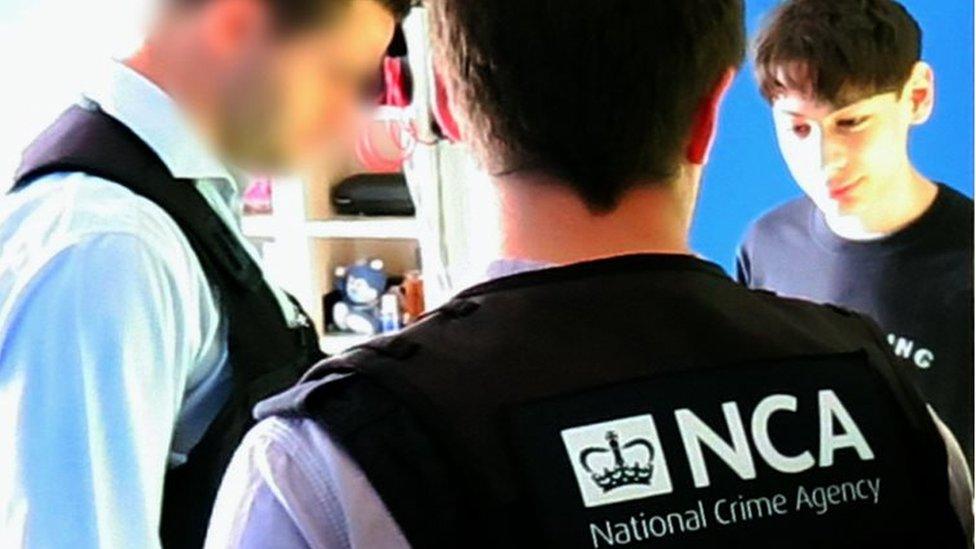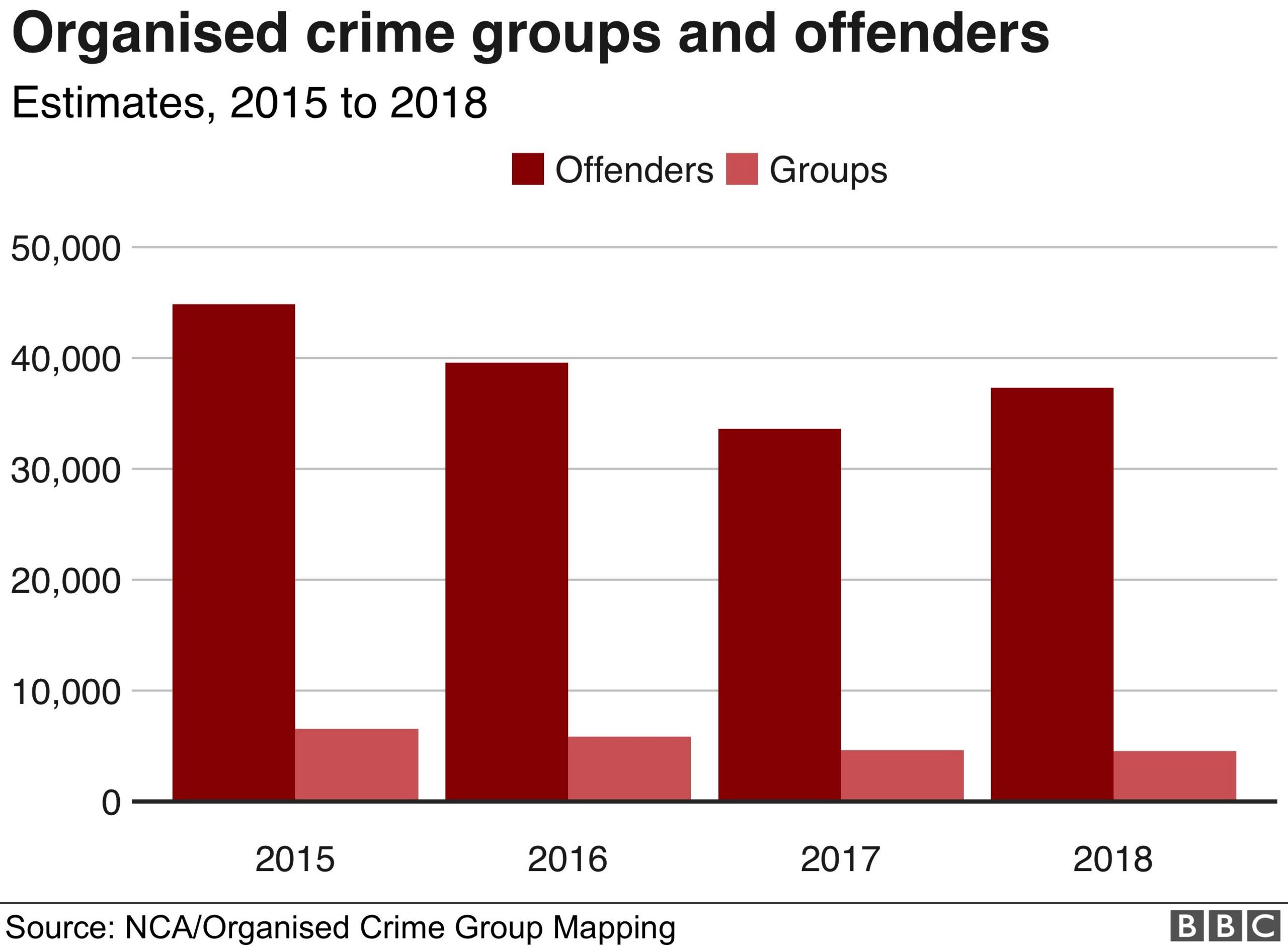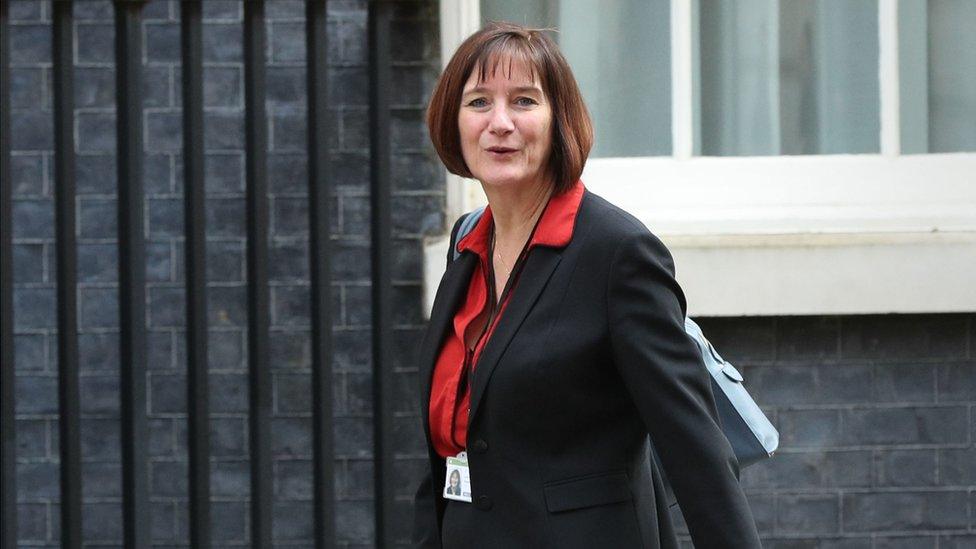NCA: 'Double our budget to fight organised crime'
- Published
- comments

Teenager George Duke-Cohan was jailed for sending thousands of hoax bomb threats to schools
The UK "can't afford not to" spend an extra £3bn on fighting organised crime over the next three years, the head of the National Crime Agency has warned.
Lynne Owens said the threat from criminal gangs is "staggering" and that the public will "feel the consequences" if the extra funds are not found.
She said the investment should include more than doubling the NCA's annual budget from £424m to nearly £1.1bn.
The government says it invests in the right tools for law enforcement.
The agency's annual review of organised crime says there are more than 4,500 groups with 37,000 members in the UK.
Speaking in central London, Ms Owens argued that the threat from drug dealers, cyber criminals, human trafficking gangs and sexual predators was growing "in scale and complexity".

Ms Owens told BBC Radio 4's Today programme the NCA faces a "chronic and corrosive threat".
She said: "It's a number of things, it's globalisation, it's the rapid use and expansion of technology, it's the development of encryption and it's the demand for services - it's the supply of drugs, and we are a nation unfortunately, with a high demand for drugs.
"It's paedophiles using the dark web to target children in their bedrooms, those who dominate communities using fear and violence through the trade of drugs and firearms and illicit finance and cyber crime."

NCA director general Lynne Owens says more investment is needed to fight organised crime

How organised crime is changing:

When asked about reports indicating that the number of organised crime groups has fallen over the past year, Ms Owens said "that's quite an old-fashioned way of looking at things.
"For example offenders operating on the dark web might only network through technology. So they won't be part of a traditional organisation, but they are a network of like-minded individuals and that is why we get to a higher figure of offenders."
At present the NCA spends £424m a year and has approximately 4,500 staff.
By contrast, it estimates that 181,000 offenders can be ultimately linked to serious and organised crime - from drug dealing through to people trafficking, cyber extortion and the trade in online sexual abuse imagery.
Ms Owens calculates that British investigators now need an extra £2.7bn over three years - to include an extra £650m annually for her agency. She says that extra cash would be less than the weekly estimated cost of organised crime to the UK.
Allow X content?
This article contains content provided by X. We ask for your permission before anything is loaded, as they may be using cookies and other technologies. You may want to read X’s cookie policy, external and privacy policy, external before accepting. To view this content choose ‘accept and continue’.
"Enhancing our capabilities is critical to our national security. If we don't, the whole of UK law enforcement, and therefore the public, will feel the consequences. Some will say we cannot afford to provide more investment, but I say we cannot afford not to."
Responding to the NCA's call for more cash, security minister Ben Wallace acknowledged the scale of the threat - but did not immediately promise any more spending.
"Our serious organised crime strategy, published in November 2018, set out how we will mobilise the full force of the state to target and disrupt serious and organised crime.
"As criminals' use of technology evolves so must our response. We continue to invest in the right capabilities and tools in law enforcement, across government and in partnership with the private sector."

How big is the challenge?

If the NCA could arrest all the gang members it knows about, they'd fill enough double-decker buses to jam every major road between the agency's headquarters and the Home Office, where its budget is set (trust me - I'll spare you the maths).
The call for more cash isn't just an operational matter - it is a big political challenge after many other warnings from police leaders about cuts.
If ministers found this huge pile of extra cash down the Whitehall sofa, it would go on not only investigators but resources for digital forensic and specialist surveillance operations.
The challenge would still be enormous - here's just one example of how quickly organised criminals shift their focus: The UK's introduction of a forgery-proofed polymer £10 note has been followed by a surge in counterfeit £20s and £50s. As fast as investigators catch up, the criminal has found a new way to make a profit.

The NCA's sixth annual review of organised crime says groups have been fragmenting and capitalising on new technology not only to hide their identities but to increase their profits.
The rise of virtual or crypto currencies - which can be exceptionally difficult to track - is helping offenders launder their profits more efficiently without leaving a trail for investigators to pick up.
On cyber-crime specifically, the UK is fighting sustained attempts by Russian-speaking gangs to make money by targeting British computers - either through ransom attacks that lock up systems or through the theft of personal banking credentials.
One of the biggest threats has been the rise in sites in hidden parts of the internet where images of sexual abuse of children are traded. The NCA estimates that 144,000 of the people involved in these dark web sites are based in the UK - 5% of all known users.
And it warns that Brexit will not only affect the ability of the NCA to work efficiently with its partners in the EU but could also lead to an increase in bribery and corruption as British companies enter into new markets around the world.